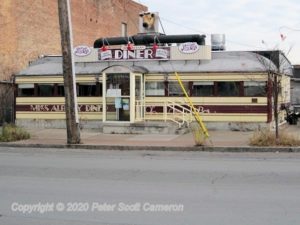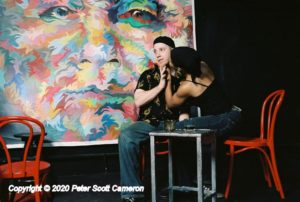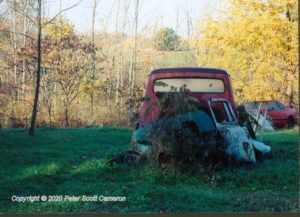
From The Albany Project.
Please visit my photography site at: www.peterscottcameron.com.

From The Albany Project.
Please visit my photography site at: www.peterscottcameron.com.
I have lived a long time. As a result, I have learned some things: not a lot, I admit, but a few useful things.
Out of this learning I have identified a handful of important laws that operate in life. Over time in this blog, I will share these with you, starting with Cameron’s Second Law today. Be sure to return here to get the other laws. You will not get these anywhere else, such as in a book or by divine revelation.
The reason that I am starting with the Second Law is because I don’t have the First Law formulated yet, although I am working on it. But when I get it, it will be terrific. It will be all-encompassing and will explain, basically, everything. Stay tuned. In any case, Cameron’s Second Law recognizes both a great spiritual Buddhist principle, along with a common experience that we have all had. You will recognize this great truth immediately.
Cameron’s Second Law states: Good things go on too long.
I will tell you how I discovered – no, that is the wrong word for this law – the correct word is realized. I realized this law during a performance of Gluck’s Paride ed Elena, which is a five-act opera that can run on for three hours and fifteen minutes.
Despite the robust presentation of Anna Netrebko and others, I do not ordinarily like recorded opera much, but I love live performances. These have everything: love, sex, jealousy, murder, intrigue, betrayal, skullduggery, lust and bloodlust, dastardliness, and nobility. It is like a British television murder-mystery on steroids, but with costumes and unbelievable singing.
At one time a favourite activity was to travel to the baseball town of Cooperstown, NY, to attend an opera at Glimmerglass. How wonderful: beautiful summer evenings, an ersatz-rustic theatre with moveable sides that open to the country air, top calibre singing and orchestration (in preparation for the fall New York season), English translations above the stage, alcoholic beverages, and lots of old people dressed in semi-casual nattiness including bow ties.
My opera watching usually follows a pattern. First it begins with acute attention and excitement, which can last right through to the intermission. After that intermission, I flag a tad, and so usually slip into a dream-like altered state – the hypnogogic state that we experience before sleep. It is restful and I can still hear the music. Sometimes, of course, I transition to a full-blown nap, but as far as I know, I have never lapsed into deep sleep with snoring. After that I awake, refreshed, and if the timing is good, we are near the finale and my attention is once again rapt, though I admit that my excitement mounts as I prepare to go home.
It was while attending the previously mentioned Paride ed Elena when I came to the realization of the Second Law. I went through the usual cycle, snapping to attention after the hypnogogic state and preparing to be excited, when it dawned on me that we were only somewhere, I believe, in the fourth act. I am unsure – there may have been a second intermission that I missed, due to extended hypnogogia or the fact that I have a case of partial psychogenic amnesia from the stress of the situation. Erasto (Cupid) had not yet even convinced Elena that she should accompany Paride to Troy. It went on and on, probably for another hour – an hour during which I could have been driving home, listening to The Zombies on my car CD player. By the time Erasto did succeed in sinking his arrow, I was ready let loose a torrent of my own arrows down on both Paride and Elena, as well as anyone else on stage.
And so there you have it: what started out as a lovely evening, with all that excitement and a beautiful setting with fantastic music along with a first-hand experience of the reform movement in Italian opera, became, after it went on too long, an ordeal.
A related example: this is why, second perhaps only to King’s I Have a Dream, Lincoln’s Gettysburg Address, at 271 words, is the greatest speech ever.
But back to opera – this happens with other operas, of course – not to pick on Gluck, but again, in Orpheo ed Eurydice, by the time Orpheo turns and looks at Eurydice and she dies, we have long been ready to throttle her ourselves.
But of course, it is not just opera; that is only the illustrative case. It is life. It happens all the time. Just think of salt-and-vinegar-flavoured-potato-chip-eating. Eat a handful and you will feel great; but eat the whole family-sized bag and see what happens. It is the same with beer-drinking and such: the first two drinks are excellent, and it never gets any better after that. In fact, to illustrate this for yourself, briefly visit any happy hour at a bar as it starts. Everybody is cheery and chipper. Then return a half-dozen hours later at closing time and see how the leftovers look.
Another example: perhaps you fall in love, and you start having incredible sex with your new beloved. For the sake of argument here, let’s just assume we are talking about a plain old cisgendered man and woman. So, you (the man, in this example) have this beautiful new mate, you can’t get enough of her and all you want to do is talk and have sex with her. And so, the two of you take two weeks off to stay at home to do nothing but talk and have sex, including all those things you have been imagining doing to someone, or having done back to you, for years. And it is a miracle. For a while. As amazing as it is, I guarantee you that after six – nay, four days or even less – you will be thinking: “I wonder if the Blue Jays are on television?” or “Maybe Walt is holding his poker game this evening.” This is nobody’s failing; no one has done anything wrong here. It is just the way it is.
If you are a baby-boomer, think about Woodstock: Jimi’s unbelievable performance aside, would not Two Days of Peace, Love and Music have been enough, provided we could work Joe Cocker in on the second day? By then you would have had your fill of seeing naked hairy people in mud, and there would have been less garbage in Yasgur’s field, too.
Good things go on too long. Much like this essay.
Of course, no less than Freud himself understood the Second Law. Aside from the obvious things like compulsions and fixations, which illustrate the point perfectly, there is his concept of Thanatos, and what he saw happening as we moved along in old age. He said we turned toward death – not merely accepting it – but embracing and welcoming it. “Enough,” we say! “Time to move along.” Though the old psychoanalyst was never wrong, in this instance I confess that the Second Law has not kicked in just yet for me, although I look forward to when it does.
Fortunately, nature and the human condition provide some limit to our excesses, even when we ourselves are inclined to blow off the Law. As the Buddhists are fond of saying, “everything changes.” To be sure, this is a comfort when we are experiencing pain or grief; at some point it changes and becomes something else and we are relieved. But the same is true of pleasures and joy; at some time, they end and if we recognize the point, we do not attach to these things. We can let them go and there is relief in that also.
This is exactly what the Second Law invites. It invites us to enjoy, but to realize it will not get any better. And so, do not attach; let it go before things go on too long.
A helpful practical recommendation for life from all this?
Leave at the intermission.
Anniversary
Do you remember
dear old one
the War
was over
the moon
was a great paper lantern
the stars
were the eyes of sorcerers.
We rode high and fast
through the swollen black mountains
we were giddy with cold
and our newness –
we had to put the rag-top down
just to let the laughter out.
It was powder blue
a Packard,
no, I’m sure they called it powder blue –
say what, a DeSoto?
I don’t think –
a Packard, I’m sure of it.
Dammit, you always –
okay, a DeSoto then.
Still, three dollars and change
took us all the way
to Vancouver
and the Chinese dawn
those days –
well, sure
of course,
you are right, let them go.
But let me say this, at least:
the moon still hangs
over the mountains.
It is a strange situation when a trip to a plastic surgeon for a basal cell removal feels like a big day out. So it is in the time of Coronavirus. For many people, this is a time of terror and tragedy: mainly for those who have gotten sick and those who have lost loved ones. But it has also been a nightmare for others: people who have lost their livelihood and their businesses, and the brave people who risk themselves by choosing to help, such as health care workers. And there are all those deemed to be “essential” workers, who have to go out in a dangerous world to work in order to pay their bills, and so that the rest of us can buy our groceries and get our prescriptions filled. It is shameful, indeed, despicable, that we pay most of them the minimum wage.
Me? I am doing fine. I am out in the country. It is easy to isolate here. Aside from my partner, there is nobody to interact with other than the ancient dog, the two cats, the deer in the fields, and the wild turkeys. We have a big yard to sit in and watch the Green Mountains of Vermont do their thing. I have nowhere that I really need to go. My monthly Social Security continues to show up in the bank account. I may lose my job as an online adjunct professor this fall because of low enrollments due to the Coronavirus, but I will be alright. I shop for groceries at 6 a.m., during the seniors’ hour at the local Price Chopper in the village. It is pleasant: uncrowded and there are no pudding-brained libertarians swaggering the wrong way down the aisles without masks. (They come out later in the day.) Occasionally I go to the drug store or the boozer’s, both deemed essential businesses. That is it. It is all easy and I admit: I am so very lucky. Of course, I miss seeing friends, my sisters, my daughter, and the grandkids, and I miss hearing live music a couple of times a month. I miss a good walk on the gritty streets of one large city or another, and once in a while I yearn for a turkey club with a big load of fries at the old silver-sided diner on Western Avenue. But the rest? I don’t miss much of it at all.
I am helped in this in that I have the gift of an introverted temperament. (More on this asset another time.) I do feel sympathy for the extraverts and their pain due to their compulsion of proximity and unmet needs for talking. Although, as compensation, they do have Zoom, and appear to enjoy it. I have seen some quite fun representations of it on television, such as Irish harp concerts conducted with people thousands of miles away from each other. But I feel no urges there. By contrast, my video camera on the laptop has had a cookie fortune taped over it for years now. I was invited to a Zoom meeting once, but I just said no, and that was that.
I am pretty happy to read, think, garden, talk with my mate, write a note to or call up a friend or family member, take a walk, play “hassle your cat” with Dudley, who loves the game, and then watch streaming shows when the shadows grow long. I do miss seeing my dear friends and family very much, but I trust circumstances will change. The car sits in the driveway: no gas to buy, no oil changes, no fumes spewing out the tailpipe. I don’t spend much money. After basic expenses, the bit I have left sits in the account and accumulates.
I repeat: I know that I am so lucky. The people of Yemen or Syria have it hard. The migrant workers of India both in this time and any time, have it hard. The poor people of Columbia, or of Brazil, with their runaway infection rates and their lunatic president, have it hard. I do not.
The relative easiness of this quiet life, along with certain news articles in The Guardian and such, have gotten me thinking. We have seen pictures of the streets of our cities blessedly free of automobiles. Beautiful: we see just a few pedestrians, a handful of bicyclists, the cities clear of smog, and sometimes there is a family of ducks or a deer crossing over. There is no maddening, gnarled tangle of streets filled beyond capacity, with all that roiling humanity on the move. The skies above are clear and there are not even any jet vapour trails marring the pristine blue. The pictures and articles, coupled with the serenity of sitting at home without much feeling of need, beg a question:
Once this is over, do we have to resume living entirely the way we have been living?
Must we return to being so busy, roaming around, fighting each other for space, sitting, frustrated and stressed in gridlocked cars, flying all over the place in jam-packed airplanes, packing ourselves on monstrous cruise ships, travelling to foreign places to trudge around with millions of other tourists on choked sidewalks, gawking at artifacts for a few seconds between line-ups at yet another café?
Do we have to burn so much carbon? Do we have to cast off so much plastic detritus and other effluent, just because of the way we live?
Imagine: what if we used this Corona-virus-imposed pause to take stock of who we are and how we live. Can we imagine a way to live that is quieter, less busy, one that draws more lightly from the planet’s core, one that touches more lightly on the planet’s surface, and one that, in the end, allows us more serenity? It would take a different view of economics, to be sure: a move from our pathological growth fixation, to a sustainability model.[i]
I am not talking about absolutes here. I am not saying that we should stop everything. Rather I am saying that we should moderate and do much less than we have been doing. We could take this dip in fossil burning as an opportunity to shift toward green energy and a green economy.
Imagine not having to go in every day of the week for those whose work allows it, fewer commutes and commuters, streets that are for walking and cycling and enjoyment, and fewer airplanes and room to stretch out on them when we do fly. Imagine our great cities – Barcelona, Venice, Prague – free from the mobs of sightseers. Imagine the Queen Victoria parked at a wharf, and instead of wandering around burning its usual 293 gallons of fuel per mile, it becomes floating housing replete with recreational facilities for an entire community’s use.
Imagine a planet that is no longer burning up. Imagine sitting at home, with plenty of time to be with our sweet, unfettered selves.
You may say I’m a dreamer, but I’m not the only one.
PSC, July 13, 2020
More in Part II.
[i] Victor, Peter A. Managing Without Growth: Slower by Design, Not Disaster. 2nd ed., Edward Elgar Publishers, 2019.

Mildred, The Miss Albany Diner, 1957
The groaning ash drops
from her smoldering cigarette,
she leans on the graying counter
peering past
the pair of demented coffee urns
toward the accused
wooden men who,
perched upright upon stools,
eyes glued on their racing forms,
pray that she will stay
her stare.
“It’s bad,” she says,
“when your man
turns out to be a bum.”
Condemned
they fall
upon their hash-browns;
beyond the nicotine window
a cold wind pounds
down from Canada
and slaps the face
of the insolent street sign.

Please visit my photography site at www.peterscottcameron.com.
MacSorely’s greatest fear was ending up as an old man on the streets. Most days on his walk, he saw the same thin old guy, with his begging cap on the sidewalk in front of him, sitting by the bank at Bloor and Bathurst.
Without fail, MacSorely would dig into his pocket for whatever change he had, and add it to the few coins – if there were any – in the hat. It wasn’t just that the man, with his dirty grey hair and grizzled chin, obviously had no relations. It wasn’t so much the shabby clothes that the man wore that frightened him, with his jeans that once might have been blue, and the oily mark that covered most of one leg, or the scruffy hand-me-down running shoes. It was not so much how he hunched his shoulders on the cold days, in the pitiless Toronto wind or cruel rain, trying to keep warm under the thin and frayed jacket that partly covered his stained hoodie. It was not that the black cap he used to collect his meager coins was filthy, nor that the man never acknowledged him.
Rather, what frightened MacSorely most was how he sat: head down, resigned, silent. A penitent.
– From MacSorley’s Great Adventure, copyright © PSC, 2020.

I am riding along in one of the wonderful red streetcars. These streetcars are enough of a reason to live in Toronto. There is nothing quite like riding in one of these – the older ones that is, with the windows open and the breeze on your face. It is like being at the midway, only it is everyday life.
I am on Dundas Street, heading west, near Bathurst. This streetcar, an older “CLRV” model, is bumping and grinding along, wheels and tracks squealing, people talking, the bell clanging, windows open, cars outside honking. It is a hot August day. The streetcar is crowded, and I am standing.
It is 2010; I have just returned to live in my home-and-native-land after thirty-five years in the States. At sixty-three, I am feeling good. I am broke and have no prospects, but I am free. I have lost fifty pounds eating sardines and walking off the anxiety of my marriage ending, and the decision to leave my secure career and change countries once again. I can walk twelve or fifteen miles without getting tired. I look like I have a six-pack – that is, unless I take off my shirt; then it is altogether a different matter.
Anyway, I am standing there, feeling good, feeling happy, feeling strong. I see a very attractive, young woman staring at me. She is probably about twenty-five. Obviously, she is very taken with me. I look away, of course, and then look back: she is still watching, looking me right in the eyes.
I am thinking: Hey, yea, I’m looking good, alright. I’ve got it going on. Still got the magic.
She stands up from her seat and moves toward me. Obviously, she is going to chat me up. I’m smiling at her.
Sir, she says, would you like my seat?

The Bittersweet Impermanence of Things.
Please Visit my photo site at: www.peterscottcameron.com.
Overheard in a diner, now gone, on Court Street in Brooklyn, NY, a few years ago. There are two servers chatting by the counter, young women in their mid-twenties, one dark-haired, and one blond with an Eastern European accent.
Server # 1 (blond): So, I met my ex-boyfriend and his new girlfriend last night at the bar, it was fun.
Server #2 (dark hair): Oh yea? I thought you hated him.
#1: No, that’s all over. I forgive him. It’s normal. It was fun, I like his new girlfriend. We danced late.
#2: Nice. Did you go home with them?
#1: Yea.
#2: Did you have sex with them?
#1: No. I was too tired. I just watched.
#2: Oh, nice.